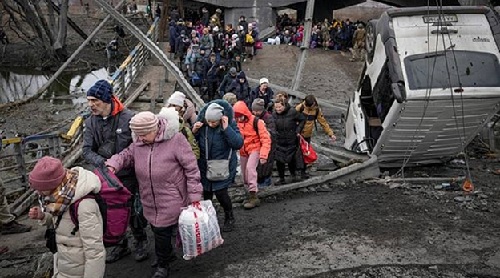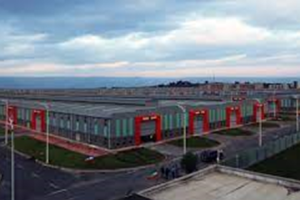
BY ABEBE WOLDEGIORGIS
The war broke out in Ukraine which ignited by the Russian aggression has been a pre-occupation for the world. Countries’ economies are affected by the war directly or indirectly. The global trade system is also feeling the pain.
Countries are importing goods with inflated prices as a consequence of the war between the two countries. The two countries supply 30 percent of wheat to the world market. Ukraine also supplies 50 percent of sun flower to the world market. Hence, the disruption on the value chain of the trade brings its own repercussion.
Europe is the major importer of Russian oil and the interruption of the supply due to war critically affects the economy. Currently, price hike is witnessed on the oil market.
Ermias Ehetu is an economist by profession and a chairman of the Zemen Bank Board of Directors. As to him, Russia supplies 40 percent of Europe’s natural gas demand and when the supply faces interruption industrial production will be affected in addition to breakdown of power supply.
It also incurs additional cost on logistics and delays supply. The two warring countries play pivotal role in supplying iron and natural gas to the world market and when shortage of supply occurs one can imagine the negative consequence. The increasing of production cost on industries brings price hike on products.
As to Ermias, the price hick witnessed in oil products also directly affects Ethiopia. If the war is prolonged and the ongoing economic sanction imposed on Russia, continues’ economic crises at global level will be exacerbated.
Extension of the war critically harms the developing countries’ economy as well. The war hampers to bring products from the war affected countries and to supply products produced in other parts of the world.
“The hampering of transport activities in the black sea unable to supply and import products to the war affected countries which in turn creates shortage of supply and increasing price,” Ermias said.
Atlaw Almaw (PhD) is an instructor at Addis Ababa University Economics Department. As to him, the impact of the war in Ukraine on Ethiopia can be explained in various forms. Due to the war, obtaining loan from multilateral institutions and from countries in bilateral relation might be hard because all loan providing parties are affected by the war.
Western countries which have a capacity to provide loan to the developing countries’ economies are affected by the war. As a result, they will pay very little attention to poor countries. The world finance system also will be affected.
The stock exchange in the world market also might be affected because shareholders in the stock might lose hope and hold their assets. Investment also declined and as a result, economic recession will occur in developed countries which in turn affect developing countries.
As to him, due to the crises, remittance obtained from Ethiopian diaspora might be declined. The two countries’ war also has its own consequence on Ethiopia’s economy and in this regard Ethiopia should not be pro-western rather it must be neutral.
Currently, Ethiopia is trying its level best to improve its relation with the IMF and the World Bank which was strained by the conflict in the northern parts of the country and some better results were witnessed. Hence, its stand on the war between these two countries should be considered in this regard.
The relation with the West also to some extent determines the nation’s currency reserve. Since the outbreak of the war, the price of oil per barrel is increasing day by day and these days the price rose to 108 US Dollar which is the highest in the world market yet and if the war is prolonged the oil price hike will continue. Recently, the government lifted the subsidy on petroleum oil and oil products and if it persists on its decision, the consequence on the economy will be harsh.
When the oil price increased internationally, the air, land and sea transportation cost will be increased. Besides, following the outbreak of the war, the production and productivity of industries in war affected countries have been declined which in turn resulted in shortage of necessary products like metals, edible oil, crops and the like.
When transportation cost of the commodities which are supplied to the market raises, ultimately the burden will go to the consumers. The problem is not limited on this, rather the inflation also transfers to the service sector.
As to Ermias, whether the oil price increases or not in Ethiopia and whether the government subsidizes the price or not, the price hike is inevitable because the inflation is imported. Importing of goods and oil products mean inflation comes due to inflated prices.
Economists are also worried that, the war might affect Ethiopian import and export business by raising the logistical costs. Europe is the destiny of Ethiopian flower export and this commodity might be affected by the war.
According to the information obtained from the Ethiopian Flower, Vegetable and Fruit Association, the war which is going on between Russia and Ukraine might harm the horticulture sector.
Therefore, to withstand the impact, the association is evaluating the matter. Currently in Particular, the flower product has no chance to enter to the Russian market hence it is understood that the sector might be affected, Tewodros Zewdie the Association’s Executive Director said.
80 percent of Ethiopia’s flower product is exported to European market mostly supplied through Netherlands market. It is also transported to the Russian market. Currently, land transportation to Russia is curtailed hence, the consequence is bad. Not only these, supplying the flower products to other European market might be difficult due to the war and some harmful effects of the war are visible.
However, Ermias does not agree what Tewodros said and explained his logic that the flower product is not directly supplied to the Russian therefore, the impact is insignificant.
But his concern is that, the problem may arise whether the flight of Ethiopian airlines to Moscow is interrupting or not. The Ethiopian airlines make its flight to Moscow through crossing the European air space and if the countries inhibit the Ethiopian not to cross their air space the consequence might be very difficult.
As to Ermias, the Ethiopian export destiny countries are Europe and Asian and the impact of the war on the export sector is might not be critical.
In addition, as Ethiopian economic integration with the foreign world is insignificant the impact also will be less. However, as long as the oil price hike continues the price of the imported commodities also increases which in turn harms the Ethiopian economy. Hence, to withstand the impact, utilization of the meager hard currency of the nation must be cautiously.
Moreover, continuing subsidizing oil price by the government must be taken as a way out to halt the impact of the imported inflation on other sector. “Subsidizing must focuses on gasoline not on benzene because the majority of the population utilizes the product on its day to day living and benzene is used by few car owners, Ermias Said. Such practice also must be replicated in other fundamental commodities. The government can draw lesson from taxation system implemented in the country. Citizens who have very tiny income are not legible to pay tax whereas the social groups who are in a high income bracket are legible to pay tax. In this regard, subsidizing benzene price is not logical because the utilizers have the capacity to pay the higher price.
As to him, the main stay of the nation’s economy is agriculture. Hence, price fluctuating in agricultural products might be inevitable due to the imported inflation of agricultural inputs as a result of the crises in the world economy. On the other hand, the role of the private sector in the economy is negligible therefore, strengthening the implementation of the home grown economic reform planned by the government is essential.
In line with the implementation of the reform, supporting the private sector is vital. In addition privatizing the huge public enterprises and reallocating the capital to other vital sectors is necessary, Ermias said.
The Ethiopian Herald March 13/2022





